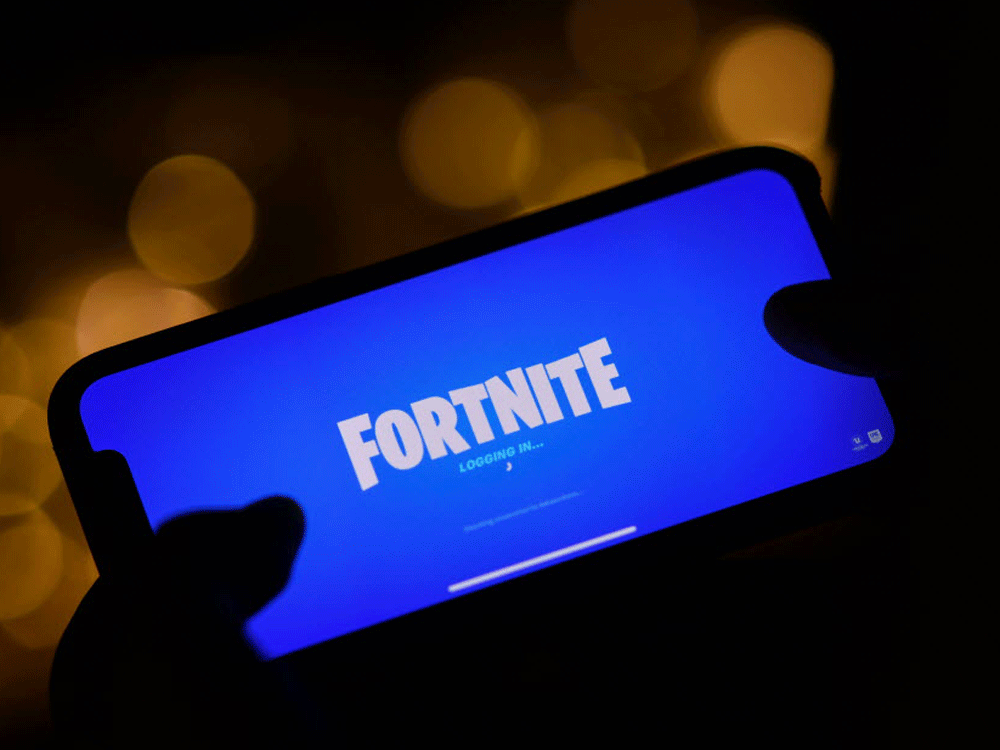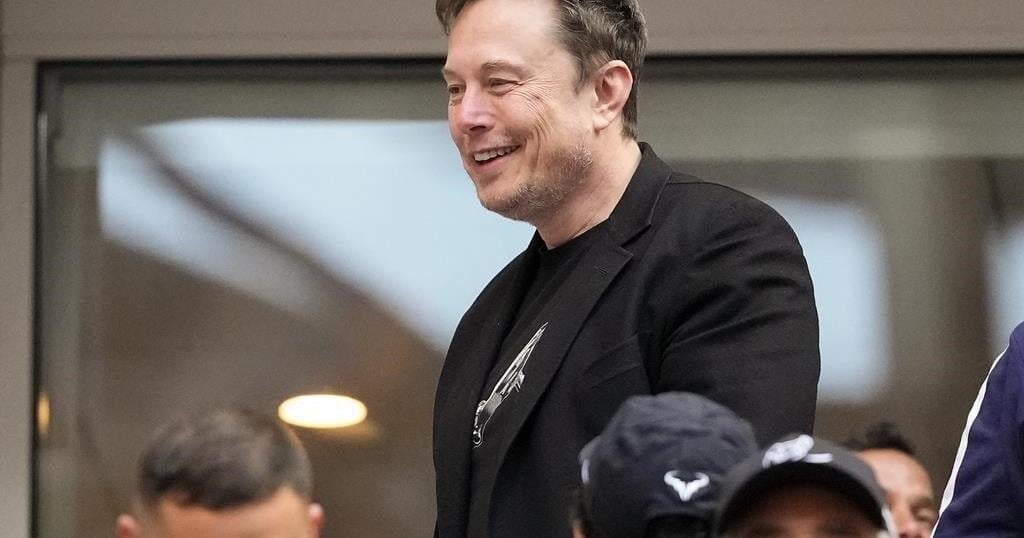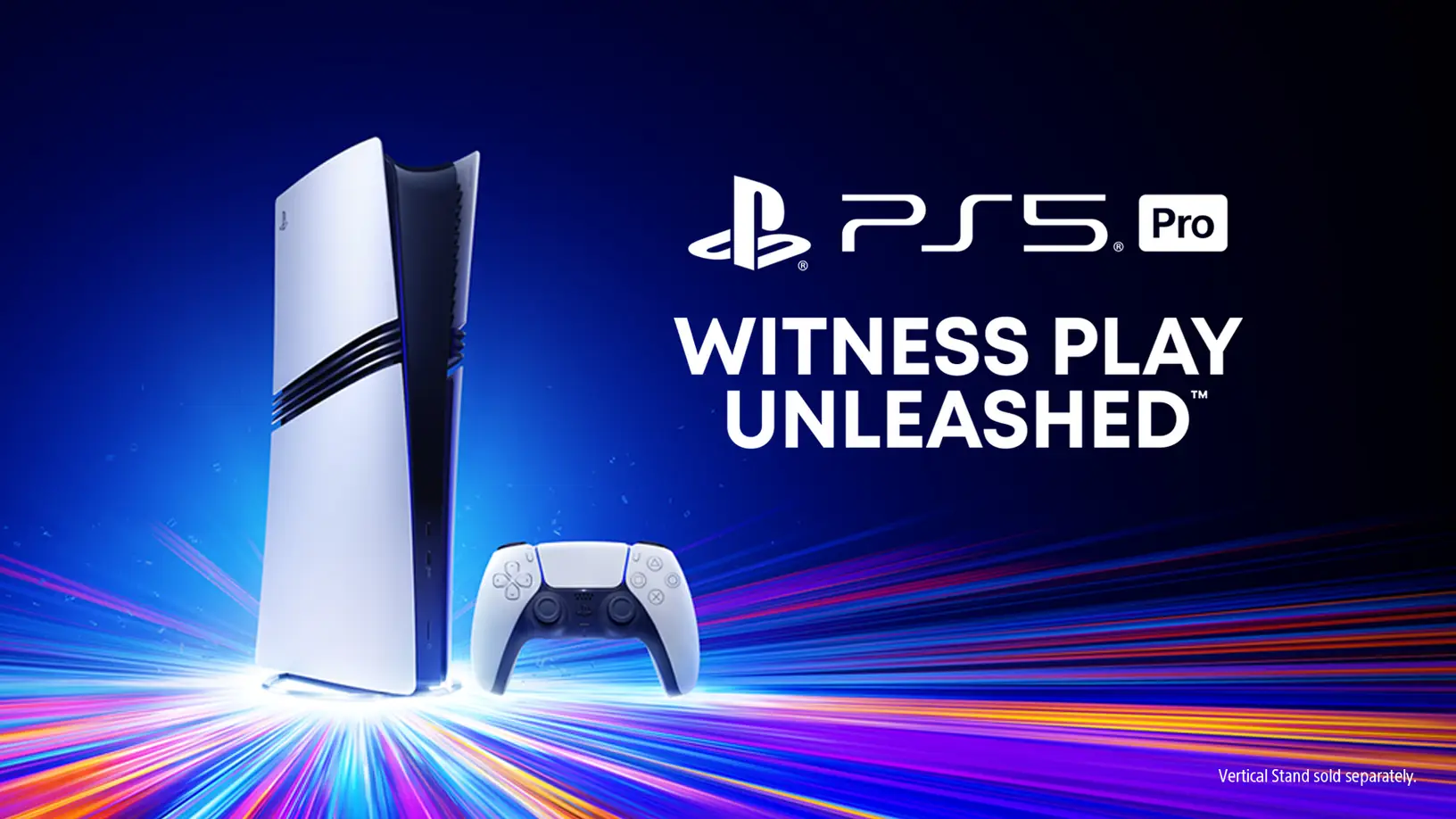If Apple barred Epic from accessing its developer tools, the iOS platform would no longer support the Unreal Engine. That would be potentially ruinous for every game that uses it
Tech
How 'Fortnite' started a war with Apple — and how it could change the entertainment industry for good – Gananoque Reporter

Early in the morning on August 13th, Epic Games, the developer behind the hugely popular online multiplayer shooter Fortnite, issued a press release in which it announced what it was calling the Mega Drop — a substantial, permanent discount on the shooter’s in-game currency, known as V-Bucks, which can be used to buy costumes, weapons, and other items in the game. A savings of more than 20% across the board, the discount, Epic was quick to emphasize, “isn’t a sale,” and would be available indefinitely on every platform.
“Starting today, any V-Bucks or real-money offers you purchase on PlayStation 4, Xbox One, Nintendo Switch, PC, and Mac are now discounted by up to 20%. You don’t need to do anything,” Epic explained. On iOS and Android, however, users would be required to select Epic’s proprietary new payment method — and if they chose to use Apple or Google’s default payment methods instead, they’d be charged full price and would not receive the special discount.
Epic was upfront, right in the press release, about the reason for the difference in price. “Currently, when using Apple and Google payment options, Apple and Google collect a 30% fee, and the up-to-20% price drop does not apply,” the developer wrote. “If Apple or Google lower their fees on payments in the future, Epic will pass along the savings to you.” It seemed strangely passive-aggressive for a video-game developer to criticize two of the most influential companies in the world, but in a Q&A issued to press, Epic doubled down: “Thousands of apps on the App Store approved by Apple accept direct payments, including commonly used apps like Amazon, Grubhub, Nike SNKRS, Best Buy, DoorDash, Fandango, McDonalds, Uber, Lyft, and Stubhub,” the release continued. “We think all developers should be free to support direct payments in all apps.”
In reporting on the announcement, the games media seemed a bit baffled. How was Epic managing to skirt the rules and bypass a seemingly iron-clad profit-sharing program? More to the point, how were they getting away with such a flagrant insult to two corporate mega-giants, whose ongoing support they presumably relied upon? “It’s not clear exactly how Epic is able to get around these fees,” a tech journalist with The Verge wrote in an article about the new discounts. The insinuation was that Apple and Google are not exactly known for permitting these kinds of monetary loopholes — and that whatever was afoot, the companies would no doubt respond soon.
What has emerged in the wake of this announcement has been more intensely heated and controversial than almost anybody could have foreseen — and as the conflict between two of the biggest and most important forces in the world of tech and entertainment comes to a head this month, the consequences for the entire industry could change things forever.
Related
It didn’t take long for things to blow. About five hours after Epic announced its new pricing model and payment option, Apple summarily removed Fortnite from the iOS store, citing the pay scheme as an infraction of its terms of service. “Today, Epic Games took the unfortunate step of violating the App Store guidelines that are applied equally to every developer and designed to keep the store safe for our users,” Apple said in a statement issued to the press that afternoon. “As a result, their Fortnite app has been removed from the store.” Apple characterized the move as a “push for a special arrangement,” but wished the developer no ill will, insisting they’d “make every effort to work with Epic to resolve these violations so they can return Fortnite to the App Store.”
Epic did not resolve the violations. In fact, Epic immediately turned around and filed a lawsuit against Apple, claiming the tech giant “unlawfully maintains its monopoly power in the iOS App Distribution Market” and prevents competition within its own app ecosystem and on mobile phones at large. “Epic brings this suit to end Apple’s unfair and anti-competitive actions that Apple undertakes to unlawfully maintain its monopoly in two distinct, multi-billion dollar markets,” the suit goes on to affirm. “Epic is not seeking monetary compensation from this Court for the injuries it has suffered. Nor is Epic seeking favorable treatment for itself, a single company. Instead, Epic is seeking injunctive relief to allow fair competition in these two key markets that directly affect hundreds of millions of consumers and tens of thousands, if not more, of third-party app developers.”
The developer’s claim is effectively that Apple, by virtue of the ubiquity of the iPhone and the iPad and by extension the iOS App Store that powers them, has a stranglehold on the entire mobile gaming market — and that by forcing developers to use the App Store to distribute games and apps, and further by forcing them to use their payment methods and offer them that unwavering 30% cut, they are violating the terms of the famous Sherman Antitrust Act of 1890. The Act is meant to thwart dominating monopolies and prevent those “unreasonable restraints of trade” of which Epic claims the App Store is widely guilty.
Essential to Epic’s argument is the wording of the discounts highlighted in their original Mega Drop release. The lowered sale price of V-Bucks was, they claimed, all about “passing savings on to consumers,” and they made a direct correlation between the 30% cut of revenues demanded by Apple on the iOS store and those savings. The implication is that Apple is in essence forcing the company to raise its prices to account for these fees — and that it’s ultimately the consumer, not the developer, who ends up paying for it. To curry the favour of consumers further, Epic developed a video about the lawsuit that riffs on George Orwell’s 1984, urging us to fight back against the totalitarianism of Apple’s market dominance.
Apple was quick to strike back — and it struck back hard. Just days after the suit was filed, Apple announced to Epic in a letter (that Epic publicly shared) that it was giving the developer two weeks to “cure their breaches” in the agreement with the company. If they didn’t resolve the issue in two weeks, Apple would “terminate Epic’s inclusion in the Apple Developer Program, a membership that’s necessary to distribute apps on iOS devices or use Apple developer tools,” according to press reports.
The effects of such a termination would be seismic — not only for Epic and Fortnite.
At the heart of the problem is a video game called Unreal Tournament — a semi-popular cult favourite shooter developed for the PC by Epic Games in 1998. Although Unreal never quite achieved the level of fame of more mainstream shooters such as Call of Duty or Halo, its “game engine” — the basic underlying architecture of programming that allows the game to function — was so advanced and sophisticated that it immediately became a favourite of game developers around the world. Creating a game engine from the ground up is so costly and time-consuming that the majority of new video games simply license a pre-existing one from another company. Since its release, the Unreal Engine has been ubiquitous in gaming, serving as the building blocks for some of the biggest and most successful games of the last 20-plus years.
About five hours after Epic Games announced its new pricing model and payment option, Apple summarily removed Fortnite from the iOS store, citing the pay scheme as an infraction of its terms of service.
Chris Delmas/AFP via Getty Images
If Apple were to bar Epic from accessing its developer tools, effectively locking it out of the backend and preventing it from making updates, adding tweaks, or working on the software in any way, the iOS platform would no longer support the Unreal Engine. That would be potentially ruinous — for not just Fortnite, but every game that uses the Unreal Engine. The massive blockbuster titles on PlayStation and Xbox would be fine, of course. But Unreal is the engine of choice for virtually every mobile game on iOS, including many of Apple’s own games on Apple Arcade.
Fearing the worst, Epic filed for a preliminary injunction, desperately urging the court to prevent Apple from doing this. Epic claimed that it would be “irreparably harmed long before final judgement comes” in the case, insisting that Apple might “irreparably damage Epic’s reputation” and “be catastrophic for the future of the separate Unreal Engine business.” Epic’s lawyer did not mince words: “The Unreal Engine will actually be destroyed. It will no longer be a usable engine.” They said that already developers were “fleeing the Unreal Engine now,” urgently jumping ship before more damage is done.
A judge presiding over the case decided in Epic’s favour on these grounds — partly. Apple has been permitted to continue keeping Fortnite off of iOS, but it cannot, for the time being anyhow, remove Epic’s access to developer tools. “Epic Games and Apple are at liberty to litigate against each other, but their dispute should not create havoc to bystanders,” the judge determined. Apple had “chosen to act severely” by threatening to come for the Unreal Engine, but had not, the judge felt, caused “irreparable harm.”
Apple, reached for comment, says it is “disappointed that we have had to terminate the Epic Games account on the App Store,” as they have “worked with the team at Epic Games for many years on their launches and releases.” They point out that the court “recommended that Epic comply with the App Store guidelines while their case moves forward,” but for now, and it seems probably going forward, “Epic has refused.” “This is not fair to all the other developers on the App Store and is putting customers in the middle of their fight,” Apple says. “We hope that we can work together in the future, but unfortunately that is not possible today.”
For the time being, the Unreal Engine is safe, and developers who rely on it can feel some immediate relief. But as the hearing is set to proceed at the end of September, the future of both the Apple iOS marketplace and Epic’s Unreal Engine are at risk of being radically changed. For Apple, it’s a question of maintaining the status quo that makes the App Store hugely successful and profitable; if Epic wins this battle, it will no doubt open the floodgates and allow every game developer to obviate the costly iOS payment system, causing their revenue stream to dry up at once. Mobile gaming is one of the biggest and most lucrative fields in the world of entertainment, and whatever transpires now, it’s clearing a turning point.
Meanwhile, Epic risks everything: its cash-cow online shooter, its back-end software business, the whole lot. Unreal Engine has become such a fundamental part of the industry that it’s not even merely powering games: it’s used on film sets to simulate special effects environments, by meteorologists to visualize weather systems, by interior designers to map out rooms, by automotive manufacturers to design cars. Clearly, Apple’s capacity to make or break the Unreal Engine will have long-term consequences that are hard to predict. As the two companies prepare to fight in court, it’s all we can do to watch the action unfold — and see the future take shape.
Tech
United Airlines will offer free internet on flights using service from Elon Musk’s SpaceX

CHICAGO (AP) — United Airlines has struck a deal with Elon Musk’s SpaceX to offer satellite-based Starlink WiFi service on flights within the next several years.
The airline said Friday the service will be free to passengers.
United said it will begin testing the service early next year and begin offering it on some flights by later in 2025.
Financial details of the deal were not disclosed.
The announcement comes as airlines rush to offer more amenities as a way to stand out when passengers pick a carrier for a trip. United’s goal is to make sitting on a plane pretty much like being on the ground when it comes to browsing the internet, streaming entertainment and playing games.
“Everything you can do on the ground, you’ll soon be able to do on board a United plane at 35,000 feet, just about anywhere in the world,” CEO Scott Kirby said in announcing the deal.
The airline says Starlink will allow passengers to get internet access even over oceans and polar regions where traditional cell or Wi-Fi signals may be weak or missing.
The Canadian Press. All rights reserved.
Tech
How to Preorder the PlayStation 5 Pro in Canada

Sony has made it easy for Canadian consumers to preorder the PlayStation 5 Pro in Canada directly from PlayStation’s official website. Here’s how:
- Visit the Official Website: Go to direct.playstation.com and navigate to the PS5 Pro section once preorders go live on September 26, 2024.
- Create or Log in to Your PlayStation Account: If you don’t have a PlayStation account, you will need to create one. Existing users can simply log in to proceed.
- Place Your Preorder: Once logged in, follow the instructions to preorder your PS5 Pro. Ensure you have a valid payment method ready and double-check your shipping information for accuracy.
Preorder Through Major Canadian Retailers
While preordering directly from PlayStation is a popular option, you can also secure your PS5 Pro through trusted Canadian retailers. These retailers are expected to offer preorders on or after September 26:
- Best Buy Canada
- Walmart Canada
- EB Games (GameStop)
- Amazon Canada
- The Source
Steps to Preorder via Canadian Retailers:
- Visit Retailer Websites: Search for “PlayStation 5 Pro” on the website of your preferred retailer starting on September 26.
- Create or Log in to Your Account: If you’re shopping online, having an account with the retailer can speed up the preorder process.
- Preorder in Store: For those who prefer in-person shopping, check with local stores regarding availability and preorder policies.
3. Sign Up for Notifications
Many retailers and websites offer the option to sign up for notifications when the preorder goes live. If you’re worried about missing out due to high demand, this can be a useful option.
- Visit Retailer Sites: Look for a “Notify Me” or “Email Alerts” option and enter your email to stay informed.
- Use PlayStation Alerts: Sign up for notifications directly through Sony to be one of the first to know when preorders are available.
4. Prepare for High Demand
Preordering the PS5 Pro is expected to be competitive, with high demand likely to result in quick sellouts, just as with the initial release of the original PS5. To maximize your chances of securing a preorder:
- Act Quickly: Be prepared to place your order as soon as preorders open. Timing is key, as stock can run out within minutes.
- Double-Check Payment Information: Ensure your credit card or payment method is ready to go. Any delays during the checkout process could result in losing your spot.
- Stay Informed: Monitor PlayStation and retailer websites for updates on restocks or additional preorder windows.
Final Thoughts
The PlayStation 5 Pro is set to take gaming to the next level with its enhanced performance, graphics, and new features. Canadian gamers should be ready to act fast when preorders open on September 26, 2024, to secure their console ahead of the holiday season. Whether you choose to preorder through PlayStation’s official website or your preferred retailer, following the steps outlined above will help ensure a smooth and successful preorder experience.
For more details on the PS5 Pro and to preorder, visit direct.playstation.com or stay tuned to updates from major Canadian retailers.
Tech
Introducing the PlayStation 5 Pro: The Next Evolution in Gaming

Since the PlayStation 5 (PS5) launched four years ago, PlayStation has continuously evolved to meet the demands of its players. Today, we are excited to announce the next step in this journey: the PlayStation 5 Pro. Designed for the most dedicated players and game creators, the PS5 Pro brings groundbreaking advancements in gaming hardware, raising the bar for what’s possible.
Key Features of the PS5 Pro
The PS5 Pro comes equipped with several key performance enhancements, addressing the requests of gamers for smoother, higher-quality graphics at a consistent 60 frames per second (FPS). The console’s standout features include:
- Upgraded GPU: The PS5 Pro’s GPU boasts 67% more Compute Units than the current PS5, combined with 28% faster memory. This allows for up to 45% faster rendering speeds, ensuring a smoother gaming experience.
- Advanced Ray Tracing: Ray tracing capabilities have been significantly enhanced, with reflections and refractions of light being processed at double or triple the speed of the current PS5, creating more dynamic visuals.
- AI-Driven Upscaling: Introducing PlayStation Spectral Super Resolution, an AI-based upscaling technology that adds extraordinary detail to images, resulting in sharper image clarity.
- Backward Compatibility & Game Boost: More than 8,500 PS4 games playable on PS5 Pro will benefit from PS5 Pro Game Boost, stabilizing or enhancing performance. PS4 games will also see improved resolution on select titles.
- VRR & 8K Support: The PS5 Pro supports Variable Refresh Rate (VRR) and 8K gaming for the ultimate visual experience, while also launching with the latest wireless technology, Wi-Fi 7, in supported regions.
Optimized Games & Patches
Game creators have quickly embraced the new technology that comes with the PS5 Pro. Many games will receive free updates to take full advantage of the console’s new features, labeled as PS5 Pro Enhanced. Some of the highly anticipated titles include:
- Alan Wake 2
- Assassin’s Creed: Shadows
- Demon’s Souls
- Dragon’s Dogma 2
- Final Fantasy 7 Rebirth
- Gran Turismo 7
- Marvel’s Spider-Man 2
- Ratchet & Clank: Rift Apart
- Horizon Forbidden West
These updates will allow players to experience their favorite games at a higher fidelity, taking full advantage of the console’s improved graphics and performance.






Design & Compatibility
Maintaining consistency within the PS5 family, the PS5 Pro retains the same height and width as the original PS5 model. Players will also have the option to add an Ultra HD Blu-ray Disc Drive or swap console covers when available.
Additionally, the PS5 Pro is fully compatible with all existing PS5 accessories, including the PlayStation VR2, DualSense Edge, Pulse Elite, and Access controller. This ensures seamless integration into your current gaming setup.
Pricing & Availability
The PS5 Pro will be available starting November 7, 2024, at a manufacturer’s suggested retail price (MSRP) of:
- $699.99 USD
- $949.99 CAD
- £699.99 GBP
- €799.99 EUR
- ¥119,980 JPY
Each PS5 Pro comes with a 2TB SSD, a DualSense wireless controller, and a copy of Astro’s Playroom pre-installed. Pre-orders begin on September 26, 2024, and the console will be available at participating retailers and directly from PlayStation via direct.playstation.com.
The launch of the PS5 Pro marks a new chapter in PlayStation’s commitment to delivering cutting-edge gaming experiences. Whether players choose the standard PS5 or the PS5 Pro, PlayStation aims to provide the best possible gaming experience for everyone.
Preorder your PS5 Pro and step into the next generation of gaming this holiday season.
-

 Sports10 hours ago
Sports10 hours agoDolphins will bring in another quarterback, while Tagovailoa deals with concussion
-

 News24 hours ago
News24 hours agoB.C. to scrap consumer carbon tax if federal government drops legal requirement: Eby
-

 Sports11 hours ago
Sports11 hours agoDavid Beckham among soccer dignitaries attending ex-England coach Sven-Goran Eriksson’s funeral
-

 News24 hours ago
News24 hours agoA linebacker at West Virginia State is fatally shot on the eve of a game against his old school
-

 News11 hours ago
News11 hours agoVancouver Whitecaps cautious of lowly San Jose Earthquakes
-

 News24 hours ago
News24 hours agoHall of Famer Joe Schmidt, who helped Detroit Lions win 2 NFL titles, dies at 92
-

 Sports19 hours ago
Sports19 hours agoCanada’s Marina Stakusic advances to quarterfinals at Guadalajara Open
-

 Sports19 hours ago
Sports19 hours agoDavid Lipsky shoots 65 to take 1st-round lead at Silverado in FedEx Cup Fall opener






















